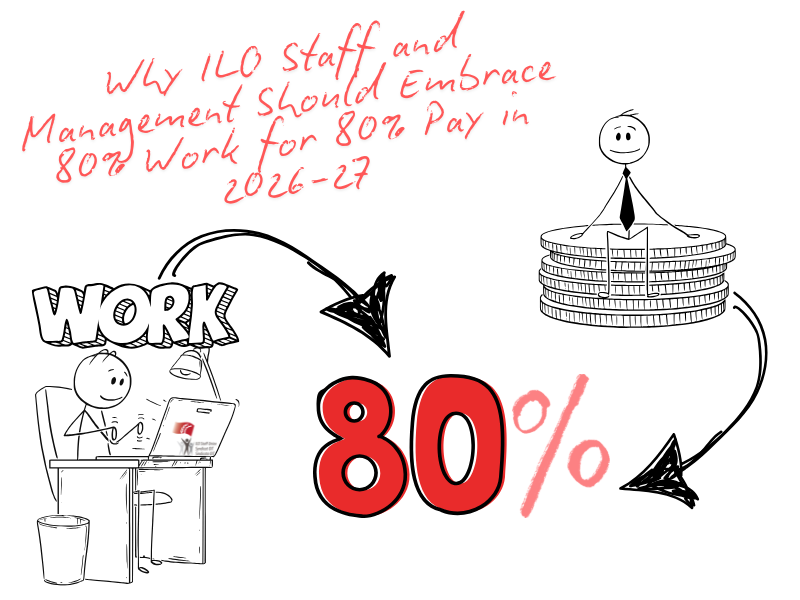The idea and proposal made in the Blog article do not represent the official position of the ILO Staff Union, but was expressed by a colleague (and we thank him for his ideas!) as a contributor to the Staff Union blog, a platform opened to all ILO colleagues.
At the bottom of this article, you will find the translation into the other working languages of the ILO.
High-pressure situations make it difficult to make the best decisions—especially when the stakes are high, and time is short. The International Labour Organization (ILO), like much of the UN system, is navigating a period of significant financial strain. Budget cuts—both confirmed and anticipated—are placing immense pressure on leadership to act swiftly. But in such environments, decisions made in haste can have unintended and lasting consequences, potentially damaging the ILO and its ability to serve its constituents in the process.
This blog outlines a proposal to help reduce the pressure on the ILO as we navigate this difficult moment. The proposal—to temporarily shift to 80% work for 80% pay during the 2026–27 biennium—is not just a cost-saving measure. It is a way to lower the temperature, reduce the urgency, and create the fiscal breathing room needed for thoughtful, carefully considered, ILO values-based decision-making.
1. Immediate Fiscal Relief Without Disruption
The 80/80 model offers a fair and minimally disruptive way to generate immediate cost savings. By reducing working hours and pay proportionally, the ILO can ease budgetary pressures and lessen the need to resort to more drastic measures. This approach buys space—space to reflect, consult, and plan more deliberately for the future.
2. Avoiding the Pitfalls of Staff Relocation
Relocating staff to lower-cost duty stations may seem like a quick fix, but it carries significant human and institutional costs. It disrupts lives, separates families, and risks losing valued colleagues who cannot or choose not to move. Morale suffers, and the sense of community and continuity that underpins effective collaboration is weakened. Moreover, the administrative and logistical costs of relocation often erode the financial benefits, making it a short-sighted solution.
3. Preserving Institutional Knowledge and Global Reach
The 80/80 approach allows the ILO to retain its full workforce, preserving institutional memory, technical expertise, and the ability to serve constituents across all regions. It ensures that the Organization remains operationally strong even in a difficult time.
4. Leveraging Productivity Gains from AI
The nature of work is evolving, and the ILO is evolving with it. Digital tools and artificial intelligence are already enhancing productivity across many areas of our work (Copilot wrote most of this blog, I just gave it arguments via prompts and added some text like this). With smarter workflows and clearer priorities, a reduced work schedule does not have to mean reduced impact. This is an opportunity to embrace innovation while maintaining quality and effectiveness. For staff, while we would indeed see a reduction in pay of 20%, we would also get an extra day of rest – 50% more weekend days!
5. A Values-Based, ILO-Aligned Solution
Staff and management coming together to agree on an 80/80 arrangement for the 2026-27 biennium would put the ILO’s core values of social dialogue, fairness, solidarity, and decent work on display for the world. Including an opt-out provision for lower-grade staff and those experiencing severe hardship would help ensure that the burden remains manageable and equitable for all. DCOMM could promote the arrangement – highlighting that the ILO is practicing social dialogue and solidarity itself as an organization. On the other side of such a sacrifice by staff, we should insist that senior management uses the space that this affords to apply the very principles we advocate for around the world in whatever other cost saving measures might be considered.
6. A Model for the UN System and Beyond
If adopted, the ILO would be the first UN agency to implement such a measure—demonstrating leadership not just in what we do, but in how we do it. It would send a powerful message: that even in crisis, we can remain strong and effective without compromising our people or our principles. It would show the world that we are unique among international organizations.
Conclusion: Compassionate Leadership in Uncertain Times
The 80% work-for-80%-pay model aims at giving the ILO more flexibility and operational breathing room during a period of high uncertainty. It would reduce pressure, protect staff, and preserve the ILO’s mission. Most importantly, it would show that we can live our values even when times are tough. In choosing this path, the ILO can lead with both courage and compassion—showing the world what it truly means to be a modern, values-driven organization.
By Steven Kapsos (and Copilot)
Version française (deepl): ici
Spanish version (deepl): aquì
